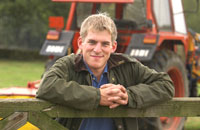Lots to learn from the Emerald Isle, says Adam Bedford

I have just returned from a visit to my soon to be in-laws in Ireland. I knew I would like the country and the people before I even got there, because I overheard conversation before my arrival, which went like this:
“So she’s marrying an Irish boy?”
“No. He’s from England.”
“Ah. There’s no bit of Irish in him at all?”
“Afraid not.”
“Oh. Is he from the North?”
“Yes.”
“Well, that’s maybe not so bad then.”
Something told me they would be a friendly and welcoming bunch.
The main topic of conversation after the “how-you-doings” and the obligatory cup of tea and a sandwich came as no surprise – the state that Ireland is in.
It is what most people seemed to be talking about, and I quickly got up to speed.
The reports I had heard of “ghost estates” – new houses left unfinished and idle – were all too real, with a surprising number of similar half-built properties in rural areas.
The Irish media also reminded me of the scale of the country’s problems – a total rescue package of some €85bn (£76bn), pain ahead in reforming the public finances and massive downsizing of the banks all imminent. There was also some serious head scratching over the small matter of where future economic growth would come from.
With a lot of people employed in the public sector, and an alarming rate of emigration of young people, it all seemed worrying to me. Standing in the pub with some of my girlfriend’s cousins, they pointed out that most of their friends were just back in town for the holidays. Many of them had recently departed for jobs overseas; to America, Australia, Canada, anywhere.
This was depressing stuff, but perhaps more positive from the perspective of Irish farmers. Agriculture and the wider agri-food sector will be at the forefront of Ireland’s recovery. With farmers having a relatively upbeat outlook, and comments from the minister for agriculture Brendan Smith noting that “it cannot be sufficiently stressed that the manufacture of food and drink products is of critical importance to the Irish economy”. Farming matters, on the whole, were top of the agenda.
This government recognition of the agri-food sector as the centrepiece to the economy is enviable. On our side of the water, with a very welcome change in tone from government on farming issues, I don’t sense that farming and the food industry is seen as part of the answer to help pull the UK out of our own economic mess. Indeed, David Cameron noted in his recent speech on economic growth that pharmaceuticals, green energy and tourism were his big-ticket industries for the future. Farming and the food industry should also have been on that list.
In Ireland, with a dynamic processing capacity in their dairy industry, an impressive commitment to Irish meat in the supermarket I visited and even details of “the Irish produce you have bought today” at the bottom of my receipt, I couldn’t help but agree that Irish agriculture will be up there with their recovery – and well placed it seemed to be.
I liked the determination of the Irish, highlighted wonderfully in a letter in their agricultural press. “So my fellow countrymen and women,” said the author, “get back on your feet, dust yourselves off and rise to the challenges that lie ahead. For the more shoulders we put to this wheel, the faster we will get it turning again.”
Farming will be a big part of turning that wheel in Ireland, and all the more reason why farming here should turn our wheels too.
Adam Bedford completed an MSc in Rural Development at Newcastle University and now works for the NFU as a policy adviser.
